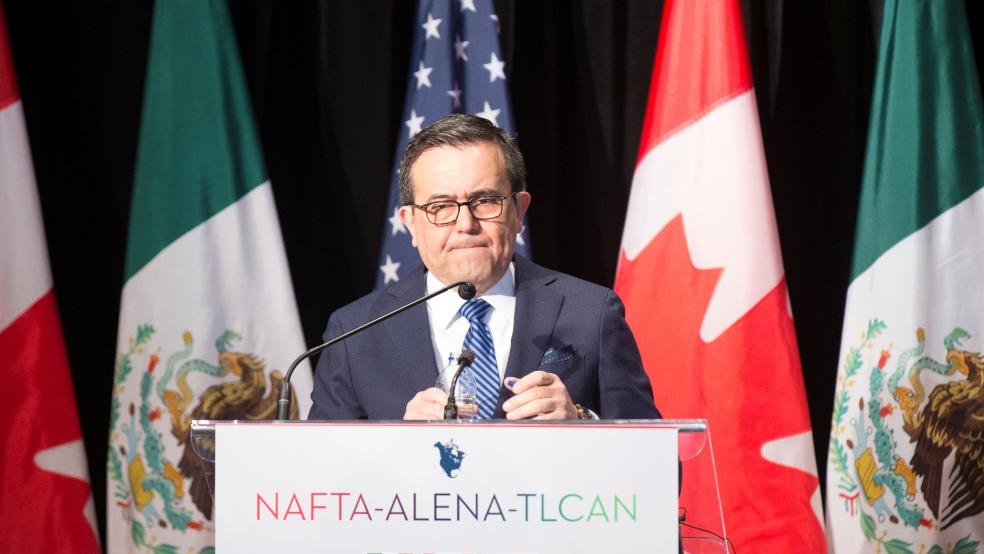OTTAWA (Reuters) - Top officials from Canada, the United States and Mexico join negotiations on modernizing NAFTA in Ottawa on Tuesday where the U.S. is expected to present draft text on issues such as labor, investment and intellectual property.
Labor leaders of the two wealthier NAFTA nations say laxer labor standards and lower pay in Mexico have swelled corporate profits at the expense of Canadian and U.S. workers, making the issue one of the major battles of the NAFTA talks. Officials with knowledge of the U.S. proposal said it would not detail wage levels for workers. Mexican business leaders have argued that workers' rights and pay is an internal issue for each country to resolve.U.S. Trade Representative Robert Lighthizer, Canadian Foreign Minister Chrystia Freeland and Mexico's Economy Minister Ildefonso Guajardo will join the talks later on Tuesday. A joint statement on the Ottawa round is expected at 2:30 p.m. eastern time on Wednesday. The next round will be held in Washington around Oct. 11.The countries are rushing to reach an agreement by the end of the year before Mexico's presidential campaign begins, a deadline that former trade negotiators have said is unrealistic. USTR spokeswoman Emily Davis said the negotiations were "progressing at an unprecedented pace" with the U.S. presenting text in 27 NAFTA chapters in the five weeks since talks began.Canadian and Mexican officials, however, have complained that the U.S. side has been slow to present proposals on the biggest issues which are likely to take time to negotiate.David MacNaughton, Canada's ambassador to the United States, on Tuesday expressed optimism the talks would succeed, saying negotiators would not succumb to panic as they continued making progress a little bit at a time."The one thing I will predict with 100-percent certainty is that before all of this is over, there will be some drama," he said in remarks after a speech in Toronto.Chief U.S. negotiator John Melle said last week the U.S. side will present new text proposals in the current round where he said "more challenging issues will start taking center stage."Asked by reporters in Ottawa about the lack of specific proposals on key issues, Melle said, "We've been working very hard so I don't see a problem."The thorniest issue in the talks, NAFTA's rules of origin that determine how much of a product needs to originate in the NAFTA region, will be discussed on Tuesday, according to a copy of the agenda obtained by Reuters, but the United States has still to present its demands on the issue.The Trump administration wants more substantial U.S. content in autos, the main source of the $64-billion trade deficit with Mexico and the $11-billion deficit with Canada. The United States is expected to partially unveil new text on a NAFTA chapter on investment but will not elaborate on changes to an investor state dispute mechanism that allows an investor from a NAFTA country to sue a member government.BETTER STANDARDSIn a Sept. 25 letter to Lighthizer, Jerry Dias, president of Canada's UNIFOR labor union, called for enforceable labor rules under NAFTA and expressed concern that the U.S. proposal closely resembled text outlined in the Trans Pacific Partnership trade pact, which Trump withdrew from. Dias said the TPP language had "major limitations" and was recently tested in a complaint by the United States against Guatemala's labor rights under the Dominican Republic-Central American Free Trade Agreement, known as CAFTA-DR."That language was just tested and the (U.S.) lost, so you would now think they'd propose language to make sure that doesn't happen again," said Dias. He said he had seen the Canadian proposal on labor standards, which referred to "fair compensation" for workers and underscored the importance of free collective bargaining.U.S. Congressman Sandy Levin, a Democrat from Michigan, who was in Ottawa at the weekend, cautioned on Monday that Democrats would not support a revised NAFTA agreement without "dramatic change" in Mexico's labor standards."Mexico's so called 'comparative advantage' not only condemns numerous Mexican workers to working in or near poverty, but it lowers wages and rips away jobs from workers in the United States, especially in the auto industry," he told the Council on Foreign Relations. (Additional reporting by David Ljunggren; Editing by Nick Zieminski)U.S. homes in on labor, investment as top officials join talks

CHRISTINNE MUSCHI



